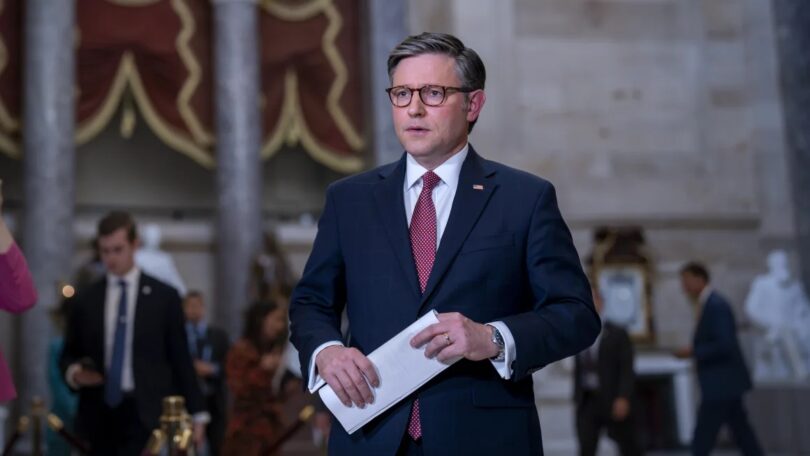Richard Galant
“We are most deeply asleep at the switch,” wrote Annie Dillard, “when we fancy we control any switches at all. We sleep to time’s hurdy-gurdy; we wake, if we ever wake, to the silence of God.”
Dillard’s line — from her short meditative book titled “Holy the Firm,” published in 1977, two years after she won the Pulitzer Prize at the age of 29 — invoked the role of the switchman, whose alertness was crucial in making sure trains got routed on the right track before the advent of automated switches.
If America’s political leaders control any switches at all, some have been asleep at the switch for a while. When the Senate voted to send new aid to Ukraine, Israel and Taiwan two months ago, House Speaker Mike Johnson took no action. The House leadership also refused to act on a bipartisan bill to address the surge of migrants across the southern border.
In both cases, Republicans in Congress were partly heeding the wishes of former President Donald Trump, who opposed more aid for Ukraine and wanted to prevent President Joe Biden from scoring any more legislative victories.
That was weeks before Trump went on trial in a Manhattan courtroom, where the man who labeled Biden “Sleepy Joe” appeared to doze off several times Monday and Tuesday while the court started the process of selecting jurors.
And it was also well before Iran directly attacked Israel for the first time. Israel responded, and while those strikes appeared to cause only limited damage, it showed the potential for wars to spiral out of control and made it even less politically tenable for the House leadership to be seen stalling on military aid measures.
When a defendant nods off, it doesn’t stop a trial from going forward. When a nation naps in the middle of international crises, the consequences can be profoundly scary.
Last week, Johnson finally acted, making clear he supports the foreign aid package, though he broke it up into four bills and added a fifth on border security. With the help of Democrats, the House approved aid to Ukraine, Israel and Taiwan on Saturday. “Despite fierce opposition from MAGA Republicans within his caucus, Speaker Johnson has decided that the imperative of the US providing this assistance is more important than pleasing all the members of his caucus,” wrote Julian Zelizer.
“Without this support, international adversaries, including Russia, Iran and China, would read the failure of the US Congress to pass legislation as a sign that MAGA’s America First agenda was triumphant. They might conclude that the age of internationalism, entrenched into American politics since World War II, had come to an end.”
“The problem for Johnson is that his decision to move forward might very well cost him his job,” added Zelizer, noting Rep. Marjorie Taylor Greene’s fierce criticism of Johnson and a House rule allowing just one member to bring about a vote to oust the speaker — which led to Kevin McCarthy’s downfall six months ago. Biden backed bipartisan legislation on the border, but in the view of Fareed Zakaria, he has missed an opportunity to take firm executive action after House Republicans scuttled the bill and launched the doomed effort to impeach and remove Homeland Security Secretary Alejandro Mayorkas.
“Biden must show he can fight. He should declare a national security emergency, send the National Guard to the border, work with Congress to suspend the asylum process and propose a new one that basically makes it impossible to get asylum if you just show up at the border,” Zakaria wrote.
“Many will scream, and it will all be challenged in court. But it will signal that Biden is taking the problem seriously. Bill Clinton often says that the American people don’t always need you to succeed, but they want to catch you trying. Joe Biden needs to be caught trying to solve the immigration crisis.”
Donald Trump’s campaign denied reports that the former president dozed off several times in court last week. But no one should be surprised at the sight of a criminal defendant seeming to nod off, noted Elliot Williams, a former prosecutor who has logged countless hours in court.
“Courtrooms don’t lend themselves to keeping people awake. They are notoriously quiet places where people are required to remain seated almost all of the time. The air is often stagnant and the ever-so-distracting handheld devices that are our lifelines to (and barrier from) the world around us are strictly forbidden … the gears of justice are not made for the 24-hour news cycle. What might be resolved in an 8-minute final segment of an episode of ‘Law and Order’ might be drawn out over days of painstaking testimony. It can take months, if not years (even in cases in which a defendant is not deliberately attempting to slow proceedings down) before a matter finally gets to trial.” Still, the selection of the jury that will pronounce a verdict on the hush money trial moved faster than expected last week. There were speed bumps though, as Patrick T. Brown noted.
“One potential juror who underwent questioning … was subsequently struck for cause after Trump’s team found social media posts from the juror referencing Trump that say, ‘Get him out’ and ‘Lock him up.’”
“Indeed, it seems unlikely that this case would be being prosecuted with the same vigor and creative legal theorizing if Trump were an everyday citizen. After all, Manhattan District Attorney Alvin Bragg came into office promising to focus on the ongoing investigation of Trump, and would have likely felt political heat from New York Democrats had he decided to close the investigation without bringing charges.”
“In the end, as The New York Times reported in March 2023, Bragg’s office took a ‘circuitous and sometimes uncertain road’ to filing criminal charges, reviving a dying investigation that originally focused on Trump’s business practices with a renewed focus on hush money payments.”
Will the trial be fair? Jeffrey Abramson, author of a book on the jury system, noted, “Impartiality is the key to jury justice, but we can hardly expect jurors to approach the case without strong opinions about Trump. Indeed, it would be disturbing to seat jurors whose only qualification was their ignorance about major news events of the day.”
“Fortunately, an open mind does not require an empty mind. We can find fair jurors who understand the difference between law and politics.” Don’t call it a hush money trial, urged Norm Eisen.
“The core issue … is not the payments to adult film star Stormy Daniels in October 2016 to conceal her claimed affair with Trump (he denies the affair took place). The core issue is why Trump made them.
“Paying hush money by itself is not a crime. The crime alleged in this case is felony document falsification, as the judge detailed. That requires intent to conceal, aid or commit another crime. Here, the prosecution alleges that the intent was to violate federal campaign finance laws and also the state statute prohibiting the ‘unlawful influence’ of an election — i.e., election interference.”
“No one can seriously dispute,” Eisen concluded, that the reason former Trump fixer Michael Cohen and Trump himself “allegedly hatched the scheme was to deprive voters of information that could have changed the outcome of an extremely close election.”
CNN







